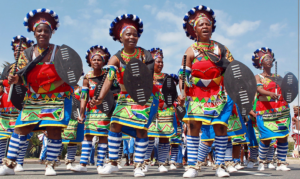|
Getting your Trinity Audio player ready...
|
Africa, a continent brimming with cultural diversity and heritage, has long been a treasure trove waiting to be discovered. From the vibrant rhythms of West Africa to the intricate beadwork of East Africa, each region offers a unique tapestry of traditions, customs, and history. In recent years, tourism cooperation among African nations has emerged as a powerful force, allowing the world to witness the richness and beauty of this incredible continent. Join us on a journey through the heart of Africa’s cultural tapestry and explore how tourism cooperation is turning this diversity into a collective strength.

Africa’s Cultural Wealth
Africa: A Mosaic of Cultures
Africa’s cultural diversity is nothing short of astounding. With 54 recognized countries and over 2,000 distinct ethnic groups, the continent boasts a kaleidoscope of languages, traditions, art forms, and cuisines. From the Ashanti in Ghana to the Zulu in South Africa, Africa’s cultural tapestry is woven with threads of history and heritage that are centuries old.
The Legacy of Ancient Civilizations
Africa is home to some of the world’s oldest civilizations, including the Kingdom of Kush in Sudan, the Great Zimbabwe in Zimbabwe, and the ancient Egyptians along the Nile. These civilizations left behind remarkable architectural wonders, art, and knowledge that continue to captivate and inspire visitors.
The Rise of Tourism Cooperation
Collaborative Efforts in the Tourism Sector
Recognizing the potential of their cultural wealth, African nations have embarked on collaborative efforts to promote tourism across the continent. Initiatives such as the African Union’s Agenda 2063 and the African Continental Free Trade Area (AfCFTA) are fostering cooperation to boost intracontinental travel.
Benefits of Tourism Cooperation
Tourism cooperation brings a multitude of benefits to participating nations. It encourages cultural exchange, generates revenue, creates jobs, and enhances the overall image of Africa as a tourist destination. Additionally, it fosters unity among nations by celebrating their shared heritage.
The Power of Cultural Festivals
Festival of African Cultures
African nations are increasingly hosting international cultural festivals that showcase their unique traditions. The Festival of African Cultures, held annually in different countries, brings together artists, musicians, and performers from across the continent to celebrate their shared heritage.
Carnival Calabar, Nigeria
Carnival Calabar, often referred to as “Africa’s Biggest Street Party,” is a prime example of successful tourism cooperation. It attracts participants and spectators from various African countries, making it a vibrant display of the continent’s cultural richness.
Heritage Preservation and Sustainable Tourism
Preserving Africa’s Cultural Treasures
Tourism cooperation goes beyond showcasing cultural heritage; it also focuses on preservation. Efforts are being made to safeguard historical sites, artifacts, and traditional practices for future generations. Organizations like UNESCO play a vital role in this endeavor.
Sustainable Tourism Practices
Cooperative tourism efforts prioritize sustainability. Eco-friendly accommodations, responsible wildlife tours, and community-based tourism initiatives are on the rise. This ensures that tourism benefits local communities and protects the environment.
The Role of Technology in Promotion
Digital Platforms for Tourism Promotion
In today’s digital age, technology plays a pivotal role in promoting tourism cooperation. Websites, social media, and virtual reality experiences are used to showcase Africa’s cultural heritage, making it accessible to a global audience.
Travel Apps and Online Booking
Travel apps and online booking platforms are simplifying the process of exploring Africa. Travelers can now plan their trips, book accommodations, and access vital information at their fingertips, fostering a seamless tourism experience.
Challenges and Opportunities
While tourism cooperation holds immense promise, it also faces challenges such as visa restrictions, inadequate infrastructure, and political instability. Addressing these barriers is crucial for the sustainable growth of African tourism.
Africa’s tourism industry has the potential to become a major economic driver. By addressing challenges, investing in infrastructure, and promoting sustainable practices, African nations can unlock this economic potential.
The Future of African Tourism
A Continent on the Rise
With a growing emphasis on tourism cooperation, Africa’s cultural richness is poised to take center stage on the global tourism map. The future holds the promise of more cultural festivals, heritage preservation, and sustainable tourism practices.
A Journey Worth Taking
As tourism cooperation continues to flourish, Africa invites the world to embark on a journey of discovery, where the tapestry of cultures, traditions, and histories weaves a narrative of unity in diversity. Come, be a part of Africa’s vibrant story.
Final Thoughts
In conclusion, tourism cooperation stands as a beacon of hope and progress for Africa. The continent’s extraordinary cultural wealth, shaped by millennia of history and diversity, is now taking center stage on the global platform. Africa’s mosaic of traditions, languages, and practices is not merely a treasure for its inhabitants but a cultural heritage for all of humanity. By coming together in a spirit of collaboration and unity, African nations are presenting this wealth to the world in an orchestrated and vibrant symphony.
You will find the following information useful :